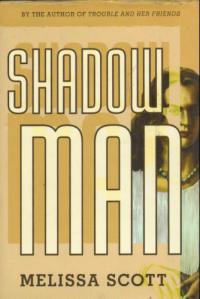In the future of Shadow Man (Tor: 1995, currently Lethe Press), a drug taken to survive FTL travel has increased intersex births and led to the widespread recognition of five body types among the Concord worlds: five sexes, called fem, herm, man, mem and woman. Each has a different set of pronouns. On the world Hara, cut off from the other worlds shortly after settlement and recently reunited with the Concord worlds, the old two-gender system remains in place despite the variety in body type. Pressure for social change on Hara is inevitable.
It’s an interesting set-up for a story. Shadow Man focuses on two people: Warreven, a Hara herm living as a man who works as a legal representative for people involved or indicted in “trade” (sex work); and Tatian, a Concord man who represents the business interests of a pharmaceutical company. Their paths cross as one of Tatian’s employees intends to testify in a case that Warreven hopes will call the gender law of Hara into question.
It’s especially interesting, to me, to read a book where five is the default instead of two. It’s surprisingly powerful.
I say this, but there are some serious flaws. The Concord system doesn’t seem to allow for change: there are nine socially accepted sexualities and people who don’t fit into those, but no mention of people who don’t fit in their bodies or who use different pronouns—no trans and genderqueer (non-quinary?) people. Body defines gender once more:
“Tatian lifted his bottle in silent toast. It had taken him most of the first year to learn to look not at bodies when he met an indigene but at the clothing that signified ‘real’ gender.”
On Hara, gender is marked by performance, not body, in a strict two-gender system, but the “odd-bodied” (Hara slang for fem, herm and mem) who want change all want to be recognised as their body-defined sex and gender in line with the Concord system.
Hara has one notable difference to the Concord culture: legal gender change is possible—but only between male and female. To a Concord person like Tatian, this is incomprehensible: “The idea, the casual switch of legal gender, was too alien, and he shied away from it.” It’s unclear whether this legal change is only used by herms like Warreven (who chose not to legally change to a woman earlier in life) or used by everyone, even men and women.
One point I particularly like about Shadow Man is its future with two systems: both flawed, but in different ways. The push for social change on Hara is to bring their gender system in line with the Concord system, recognising fem, herm, and mem in addition to men and women—ending that multiplicity of systems, not entirely for the better. The need for fem, herm and mem recognition on Hara is vital, but it is never stated what will happen to other aspects of the Hara system. The ability to legally change gender or perform a gender that doesn’t ‘match’ the body (from a Concord perspective) is currently tied to the flawed two-gender system, but could become part of an open system that recognises more sexes and genders—and fluidity. There is no suggestion that the Concord system of five rigid sexes (that determine five rigid genders) is also flawed. The ending of Shadow Man reinforces the idea that change will come from learning about the Concord system rather than synthesising that system with the local way.
Warreven says, near the end: “It’s not just that I don’t know what to do, or how to do it, which I don’t, but— It’s what I said, we don’t have a word for revolution or a word for herm, and I’m supposed to invent both of them.” And, just before that: “Off-world, in the Concord—well, I can learn what I need there.”
It’s the difference between learning the Concord word for ‘herm’ or making one for Hara—and, bigger than a word, a new system of sex and gender—and it’s strongly suggested that Warreven will learn the Concord way.
Reading Shadow Man, I was equal parts excited and frustrated. It’s simultaneously post-binary and reinforcing the ideas that uphold the binary gender system in the present day. It’s powerful to read about five being the default—it’s a blunt, in-your-face destabilisation of the idea that bodies and genders only come in two. Though this took the FTL drug to instigate (rather than the recognition that intersex and non-binary people have always existed), the book acknowledges that the “good old days” of the pre-FTL time were not as rigid as everyone thought:
“…only two genders, two roles, two complementary parts to play. Even if those days had never truly existed, it was still a compelling image to a certain minority…”
If only Shadow Man took the destabilisation further, subjecting the Concord five-sex/gender system to the same scrutiny that the Concord system subjects ours.
Alex Dally MacFarlane is a writer, editor and historian. Her science fiction has appeared (or is forthcoming) in Clarkesworld, The Other Half of the Sky, Gigantic Worlds, Solaris Rising 3 and The Year’s Best Science Fiction & Fantasy: 2014. She is the editor of Aliens: Recent Encounters (2013) and The Mammoth Book of SF Stories by Women (forthcoming in late 2014).










